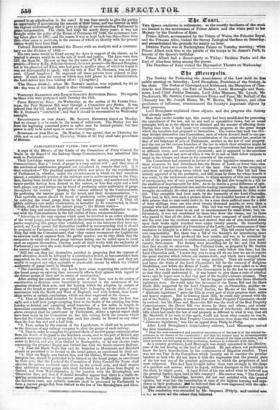PARLIAMENTARY PAPER— THE GAUGE REPORT.
A dopy of the Minute of the Lords of the Committee of Privy Council for Trade on the Report of the Railway Gauge Commissioners, was submitted this meek to Parliament.
Their Lordships express their concurrence in the opinion expressed by the ,Commissioners, that a "break of gauge is a very serious evil"; and that none of -the mechanical contrivances proposed are calculated to remedy that evil. It is ,then rernarked—" The practical question which now arises for the consideration Si Parliament is, whether, under the citcartistances in which we find ourselves 'placed, a considerable portion of the railways now in active operation its the king dom, having been formed on the broad or seven feet gauge, and another and much larger portion having been formed on the narrow, or four feet eight and a half inch gauge, any just means can be found of producing entire uniformity of gauge throughout the country." Quoting the reasons adduced by the Commissioners 'for preferring "the narrow gauge to the broad, and their recommendation, "1. That equitable means should be found of producing entire uniformity of gauge by reducing the broad gauge lines to the narrow gauge"; and "2.. That all :public railways now under construction, or hereafter to be constructed, in Great -Britain, shall be formed on the narrow gatige"; the Minute states-
" After long and anxious deliberation, my Lords are unable altogether to con- :tar With the Commissioners in the fall extent of these recommendations.
"Adverting to the vast expense which must be involved in an entire alteration of the broad gauge, and having regard to the circumstances under which the com- panies employing this gauge were established, and to the interests they have ac- quired, my Lords cannot feel themselves justified in recommending that it should be proposed to Parliament to compel the entire reduction of the severi feet gauge. ,They feel with the Cbmaasioners, that they cannot recommend the Legislature -to sanction such an expense from the public monies; nor do they think that the :oompanies to which the broad gauge railways belong can be called upon to incur such an expense themselves, (having made all their works with the authority of Parliament,) nor even the more limited expense of laying down intermediate rails ,for narrow gauge traffic. "Still less can they feel themselves justified in proposing that the expense of such alteration should be defrayed by a contribution levied, as hasnometimes been suggested, on the rest of the railway companies 'in Great Britain; and they are unable to suggest any other equitable or practicable means by which the desired . uniformity of gauge could be obtained. "The conclusion to which my Lords have come respecting the reduction of the broad gauge on existing lines necesearily affects their opinion with regard to the future gauge of lines now in course of construction." After stating the conditions on which some of the lines now in the course of ,construction in districts more immediately interested in the settlement of the question obtained their acts, and the bearing which the adoption by certain of them of the broad or narrow gauge would have in keeping up the chain of com- munication with the North am! ‘Vest of England, and with Ireland, their Lord- ships arrive at certain conclusions, which are thus expressed at the close- . " L That no line shall hereafter be formed on any other than the four feet eight and a half inch gauge excepting lines to the South of the existing line from • London to Bristol, and excepting small branches of a few miles in length, in immediate connection with the Great Western Railway; but that no such line as above excepted shall be sanctioned by Parliament, unless a special report shall :have been made by the Committee on the bill, setting forth the reasons which have led the Committee to advise that such line should be formed on any other than the fear feet and and a half inch.
"2. That, unless by the consent of the Legislature, it shall not be permitted . to the directors of any railway company to alter the gauge of such railway:
"3. That in order to complete the general chain of narrow gauge communication from the North of England to the Southern coasts, and to the port of Bristol, any suitable measures should be promoted to form a narrow gauge link from Glou- cester to Bristol, and also from Oxford to Basingstoke, or by any shorter route connecting the proposed Rugby and Oxford line with the South-western Railway. "4. That the South Wales line and its branches to Monmouth and Hereford should be permitted to be formed on the broad gauge, as sanctioned by their act. "5. That the Rugby and Oxford line, and the Oxford, Worcester and Wolver- hampton line, should be permitted to be-formed on the broad gauge, as sanctioned L by their acts; that the ords of the Committee of Privy Council for Trade shall exercise the powers conferred upon them by the several acts, and shall require " that additional narrow gauge rails shall forthwith be laid down from Rugby to Oxford, and from Wolverhampton to the junction with the Birmingham and , Gloucester line; and that if it should hereafter appear that there is a traffic re-
quiring accommodation on the narrow gauge from the Staffordshire districts to tlie Southern coast, &Tv suitable measure shall be promoted by Parliament to form a narrow gauge link from Oxford to the line of the Birmingham and Glou- siester,Railwajs"


























 Previous page
Previous page